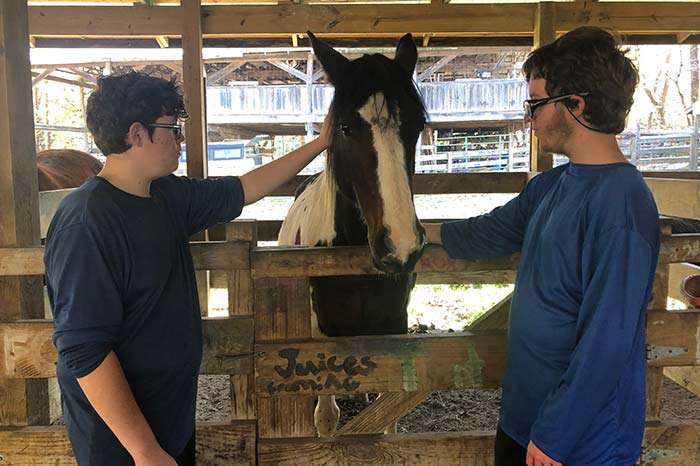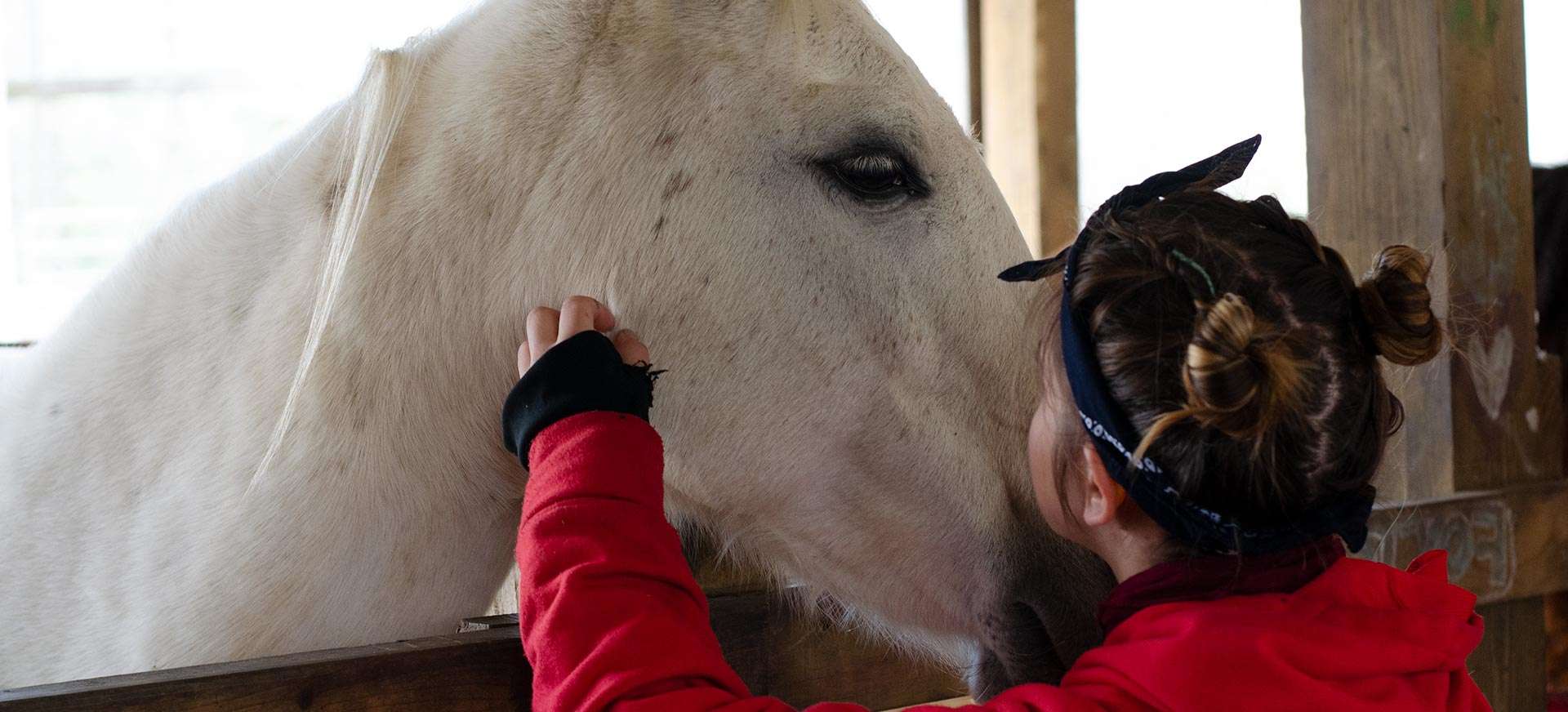An Invaluable Resource for Social Behavioral Feedback
Our equine therapy programs offer students a host of benefits.
In our experience, horses tend to be helpful in providing social behavioral feedback in both honest and immediate ways. A horse’s response to a student's intentions, anxiety or calmness, etc is not a debatable conflict. In essence, the horse can provide feedback by drawing closer or stepping away and that feedback is not disputable.
When students learn to approach horses in a way that the horse reflects and responds positively we see a gain in confidence. The take-home for our students is the carry-over of this lesson into other interactions beyond the “barn”.
Many times troubled youth can draw lessons from their interactions in our equine program that they aren’t prepared to “hear” from a parent, or staff member for that matter. Horse therapy for troubled youth creates an incredible opportunity in a unique form of nonverbal communication.
As the “light bulb” begins to go off for our students in these interactions, our therapists are able to step in and help guide their process to make this new information accessible in other interactions. With parents, peers, teachers, and beyond, there is a powerful transformation that our students experience in working with our equine program.

The Benefits of Equine-Assisted Therapy at Trails Carolina
With its remarkable capacity to heal and empower, our equine-assisted therapy programming has shown great promise in assisting our students who face a diverse range of conditions and challenges.
Some of the areas where we have seen equine therapy demonstrate its effectiveness with our students include behavioral challenges, social-emotional development, and mental health treatment.
Equine-Assisted Therapy for Mental Health Treatment
Equine therapy for anxiety, depression, and PTSD becomes a guiding light for individuals grappling with these mental health conditions. Through engaging with therapy horses, students learn emotional regulation, self-awareness, and healthy coping skills.

Anxiety can be debilitating, making it challenging for our students to engage fully in daily life. Equine therapy offers a unique opportunity to alleviate anxiety symptoms and help students develop effective coping mechanisms.
Physically, interacting with or riding horses has a calming effect on the nervous system, lowering blood pressure and reducing stress and anxiety levels. The rhythmic motion of horse riding can also regulate breathing and promote relaxation.
Socially, the personal connection and therapeutic relationship built with the horse helps our students feel supported, boosting their confidence and reducing anxiety levels over time.
Equine therapy offers a supportive and safe environment for students to process traumatic experiences. While interacting with horses, our students learn to regulate their emotions, build trust, understand and set boundaries, and develop a sense of control.
Additionally, the non-verbal nature of the interaction allows students to express their feelings without relying solely on words, which can be challenging for trauma survivors.
Equine therapy facilitates self-awareness and emotional regulation by encouraging individuals to attune to their own emotions and body language.
Horses are highly intuitive animals, picking up on even the subtlest cues from humans. By interacting with horses, individuals become more aware of their own emotional states and learn to regulate them effectively. This newfound awareness translates into improved self-efficacy, emotional resilience, and the ability to navigate challenging situations.
Equine therapy empowers individuals to recognize and manage their emotions, fostering personal growth, emotional well-being, and overall health.
Equine-Assisted Therapy for Behavioral Problems
For those dealing with behavioral challenges like aggression, impulsivity, defiance, and conduct disorders, equine therapy provides a unique platform for growth. It fosters responsibility, empathy, and self-control, helping individuals develop healthier behavioral patterns.

For individuals struggling with aggression and oppositional defiance, equine therapy can be a transformative experience. Horses respond to assertiveness, rather than aggression, teaching individuals the importance of boundaries and respectful behavior.
Through horse care, therapeutic riding, and equine-assisted learning activities, our students learn to channel their energy in productive ways, developing problem-solving skills and emotional self-regulation.
The structured and supportive nature of equine therapy helps individuals build healthy relationships, improve communication, and decrease aggressive behaviors.
Equine-Assisted Therapy for Social-Emotional Development and Learning Differnces
Equine therapy acts as a supportive ally for individuals with autism spectrum disorders, learning differences, and developmental delays. Interactions with horses enhance social skills, team building, communication, sensory integration, and motor coordination, providing valuable tools for navigating the world.

Equine therapy has shown remarkable benefits for individuals on the autism spectrum. Horses provide a non-judgmental and predictable environment, which can be especially comforting for individuals with autism.
Equine-assisted activities encourage social interaction, non-verbal communication, and emotional expression. Through horse riding and horse care, individuals with autism can practice motor skills, balance, and coordination. The bond formed between the individual and the horse also enhances their ability to develop relationships and connect with others.
Interacting with horses provides physical activity and sensory stimulation, which can improve attention and reduce hyperactivity.
We've seen how building a bond with horses helps our students who struggle with focusing regulate emotions and boost self-esteem. Working with these sensitive animals requires focus and concentration, enhancing these skills in individuals.
Horses communicate non-verbally, teaching non-verbal communication and fostering social skills in group settings. Regular sessions and horse care develop a routine, responsibility, organizational skills, and time management.
Get started today
Contact us today to learn how Trails Carolina can help your family
Trails saved my daughter’s life. Amanda is an amazing human and a brilliant therapist. I am so grateful to her, Science Steve, and the other wonderful people who could reach my daughter at a time when I could not.
Margot Lowman August 2022
Great life changing experience for our son. After becoming addicted to gaming during covid he was very depressed. At Trails he experienced the wilderness, Science Steve, learning survival skills and top notch therapy and support etc… I highly recommend! This gave our son and our family a renewed family bond full of love and excitement about his bright future.
Winnifred Wilson July 2022
Outstanding clinical work and superb staff! There’s a great culture at this company and it shows with how they engage with families/clients.
Kristin Brace June 2022
The Evidence Behind the Benefits of Equine Therapy
- In a 2023 research review titled Effects of Equine-Assisted Activities and Therapies for Individuals with Autism Spectrum Disorder: Systematic Review and Meta-Analysis, it was found that equine-assisted activities and therapy programs "can substantially improve the social and behavioral functioning and language abilities of children with autism spectrum disorders" as well as result in "decreased parental stress and improved family functioning" (Xiao, 2023).
- Based on a 2022 study titled Therapeutic horseback riding for at-risk adolescents in residential care, research shows that equine-assisted therapies can have positive psychological effects in at-risk adolescents. Additionally, while working with the horses, "the participants were able to gain an internal locus of control, confidence, and competence and clarify the boundaries of their own autonomy" (Weiss-Dagan, 2022).
- According to a 2019 study titled Benefits of Animal Assisted Therapy in Mental Health, "animal assisted therapy, as a complementary approach to traditional therapies, leads to several important benefits for patients suffering from mental illnesses" which include an "[improved] self-image and overall quality of life." Additionally, research also shows that the presence of therapy animals, such as horses, can lead to a decrease in anxiety and aggression (Koukourikos, 2019).
- A 2015 study titled Equine-assisted therapy for anxiety and posttraumatic stress symptoms found that immediately following an equine therapy session, children reported feeling "significantly reduced posttraumatic stress symptoms, less severe emotional responses to trauma, less generalized anxiety, and fewer symptoms of depression" than prior to the interacting with the therapy horses (Earles, 2015).
- In a 2015 Queen’s University study titled Equine therapy can improve social skills of at-risk youth, research shows at-risk youth between the ages of 11 and 18 were invited to a farm to take part in a four-day summer camp-style program during which they were given instruction on how to interact with horses. All activities at the program were geared toward understanding how to get the horse to do what the participants wanted it to do—and to understanding how the horse influenced them. After this program, all participants noted a change in their communication with peers, family, and friends (Bouchard, 2015).
Contemporary Articles
A New York Times article described a facility in New York helping troubled adolescents learn communication skills through equine relational programming. These adolescents were born into poverty, and some were born with a chemical dependency. With equine relational work, these young people have learned to be productive, healthy members of society.
Equine Work Defined By:
Wikipedia
Wiktionary
Wikiversity
Wiki Commons
Wikidata
Your Little Professor
Equine-Assisted Therapy FAQs
Equine therapy, also known as horse therapy, is a form of therapeutic intervention that uses interactions with horses to promote emotional, physical, and mental well-being.
Activities like grooming, riding, and caring for horses help reduce stress, improve communication, and enhance self-confidence.
Equine therapy is often combined with talk therapy and occupational therapy to assist individuals with mental health conditions, behavioral issues, and disabilities.
Equine therapy offers transformative benefits for individuals of various age groups, including children, adolescents, and young adults, who are dealing with emotional, behavioral, and mental health issues.
At Trails Carolina, we specialize in working with boys and girls aged 10 to 17 who are facing challenges in these areas, as well as learning differences.
Our equine-assisted therapy programming has shown remarkable positive outcomes for students with conditions such as anxiety, depression, PTSD, ADHD, autism spectrum disorders, communication difficulties, low self-esteem, and lack of confidence.
Equine-assisted therapy has demonstrated effectiveness in a wide range of populations and conditions. Numerous studies and research articles have shown positive results, supporting the effectiveness of equine-assisted therapy in addressing mental health challenges, behavioral issues, trauma, and developmental disorders, particularly in children and teens.
However, it's important to note that equine therapy is often used as part of a comprehensive treatment plan, and individual progress depends on factors such as the individual's commitment, therapeutic relationship, and treatment goals.
Learn more about equine therapy benefits and research.
Equine-assisted therapy provides an ideal setting for improving social skills and developing meaningful connections. Therapy horses are highly perceptive animals that respond to human behavior and emotions. Through interactions with horses, individuals learn to interpret and respond to non-verbal cues, such as body language, which translates into improved social awareness.
The collaborative activities involved in equine therapy, such as grooming and leading horses, promote teamwork, cooperation, and effective communication.
These experiences help individuals develop empathy, trust, and respect, fostering the development of healthy and fulfilling relationships.
Equine therapy is particularly beneficial for individuals with learning differences due to its unique and multi-sensory nature.
Interacting with therapy horses can engage multiple senses, including touch, sight, and sound, which can enhance learning and cognitive processing. Additionally, the structured activities involved in equine therapy help individuals develop emotional regulation skills, improve coordination, and enhance problem-solving abilities.
The non-judgmental and accepting nature of horses also creates a supportive environment for individuals with learning differences to build confidence, self-esteem, and a sense of accomplishment.
